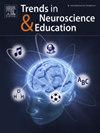Longitudinal study on the impact of short-term radiological interpretation training on resting-state brain network hubs
IF 3.4
Q2 NEUROSCIENCES
引用次数: 0
Abstract
Radiological expertise develops through extensive experience in specific imaging modalities. While previous research has focused on long-term learning and neural mechanisms of expertise, the effects of short-term radiological training on resting-state neural networks remain underexplored. This study investigates the impact of four weeks of radiological interpretation training on resting-state neural networks in 32 radiology interns. Using behavioral assessments and resting-state fMRI data, a Recursive Feature Elimination Support Vector Machine (RFE-SVM) model achieved 82% accuracy in classifying data from the pre- and post-training phases. Key brain regions linked to attention, decision-making, working memory, and visual processing were identified, providing insights into how short-term training reshapes intrinsic brain networks and facilitates rapid adaptation to new skills. These findings also lay a theoretical foundation for designing more effective training programs.
短期放射解译训练对静息状态脑网络中枢影响的纵向研究
放射学专业知识通过在特定成像模式方面的丰富经验而发展。虽然以前的研究主要集中在长期学习和专业知识的神经机制上,但短期放射训练对静息状态神经网络的影响仍未得到充分探讨。本研究调查了32名放射学实习生为期四周的放射学解读训练对静息状态神经网络的影响。使用行为评估和静息状态fMRI数据,递归特征消除支持向量机(recurrent Feature Elimination Support Vector Machine, RFE-SVM)模型对训练前后阶段的数据进行分类,准确率达到82%。研究人员确定了与注意力、决策、工作记忆和视觉处理相关的关键大脑区域,从而深入了解短期训练如何重塑大脑内在网络,并促进对新技能的快速适应。这些发现也为设计更有效的培训方案奠定了理论基础。
本文章由计算机程序翻译,如有差异,请以英文原文为准。
求助全文
约1分钟内获得全文
求助全文
来源期刊

Trends in Neuroscience and Education
NEUROSCIENCES-
CiteScore
6.30
自引率
6.10%
发文量
22
审稿时长
65 days
 求助内容:
求助内容: 应助结果提醒方式:
应助结果提醒方式:


